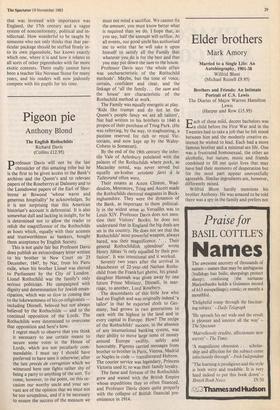Pigeon pie
Anthony Blond
The English Rothschilds Richard Davis (Collins £12.95)
Professor Davis will not be the last chronicler of this amazing tribe but he is the first to be given access to the Bank's
archives and the Queen's and to relevant papers of the Roseberrys at Dalmeny and to the Lansdowne papers of the Earl of Sher- borne at Bowood 'whose warm and generous hospitality' he acknowledges. So it is not surprising that this American historian's account is deferential. It is also somewhat dull and lacking in insight, for he is determined not to allow the reader to relish the magnificence of the Rothschilds as hosts which, equally with their acumen and trustworthiness as bankers, bought them acceptance by English Society.
This is not quite fair but Professor Davis does publish an extraordinary letter written to his brother in New Court on 23 December, 1847, by Nat, from his Paris exile, when his brother Lionel was elected to Parliament by the City of London. Lionel Rothschild was the family's only serious politician. He campaigned with dignity and determination for Jewish eman- cipation, which was so slow in coming due to the lukewarmness of his co-religionists including Disraeli, beloved but not always believed by the Rothschilds — and to the continual opposition of the Lords. The Rothschilds were determined to overcome that opposition and here's how.
I regret much to observe that you think it necessary to use certain means to secure some votes in the House of Lords, which are not peculiarly com- mendable. I must say I should have preferred to have seen it otherwise; after the late prods de corruption which we witnessed here one fights rather shy of being a party to anything of the sort. To come, however, to the point, on this oc- casion our worthy uncle and your ser- vant are of the opinion that we must not be too scrupulous, and if it be necessary to ensure the success of the measure we must not mind a sacrifice. We cannot fix the amount, you must know better what
is required than we do. I hope that, as you say, half the amount will suffice. At all events, our good uncle has authorised me to write that he will take it upon himself to satisfy all the Family that whatever you,do is for the best and that
you may put down the sum to the house.
Professor Davis says 'the whole affair was uncharacteristic of the Rothschild
methods'. Maybe, but the tone of voice, certain, confident and clear, and the linkage of 'all the family... the sum and the house' are characteristic of the Rothschild method at work.
The Family was equally energetic at play. 'Ride like trumps and do not let the Queen's people fancy we are all tailors', Nat had written to his brothers in 1840 a propos of their purchase of Tring Park. (He was referring, by the way, to staghunting, a pastime reserved for rich or royal Vic- torians, and now kept up by the Waley- Cohens in Somerset).
By the end of the 19th century the infer- tile Vale of Aylesbury pululated with the
palaces of the Rothschilds where pork, as Macaulay noted, was never served but equally un-kosher ortolans farci d la Talleyrand often were.
Their estates at Aston Clinton, Wad- desdon, Mentmore, Tring and Ascott made the Rothschilds electoral magnates in Buck- inghamshire. They were the dynamos of the Bank, as important to them political- ly in the widest sense as Versailles was to Louis XIV. Professor Davis does not men- tion their Visitors' Books; he does not understand that in England the big deals are set in the country. He does not see that the Rothschilds' most powerful weapon, always bared, was their magnificence. ... Their general Rothschildish splendour' wrote Henry James 'is only equalled by their pro- fusion'. It was intentional and it worked.
Seventy two years after the arrrival in Manchester of 22-year-old Nathan Roths- child from the Frankfurt ghetto, his grand- daughter Hannah was given away by one future Prime Minister, Disraeli, in mar- riage, to another, Lord Rosebery.
The descendants of this little Jew who had no English and was originally indeed 'a tailor' in that he exported cloth to Ger- many, had grown in two generations to rank with the highest in the land and in every capital in Europe. How? The recipe of the Rothschilds' success, in the absence of any international banking system, was their ability to move large sums of money around Europe swiftly, safely and honorably. Pigeons carried messages from brother to brother in Paris, Vienna, Madrid or Naples in code — transliterated Hebrew.
The courier service was legendary, Princess Victoria used it; so was their family loyalty. The fame and fortune of the Rothschilds grew and waned with the British Empire whose expeditions they so often financed, and Professor Davis closes quite properly with the collapse of British financial pre- eminence in 1914.


























































 Previous page
Previous page